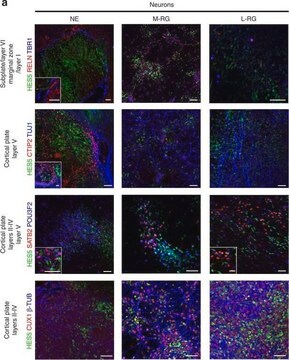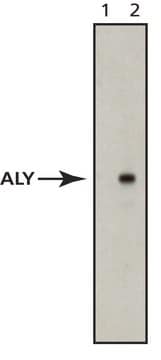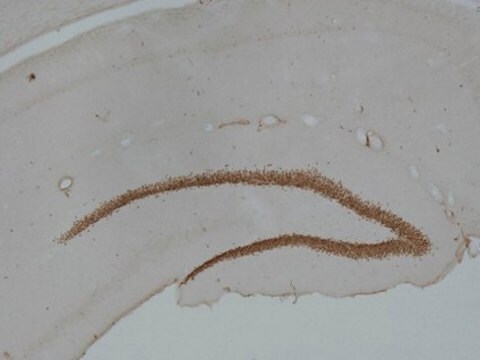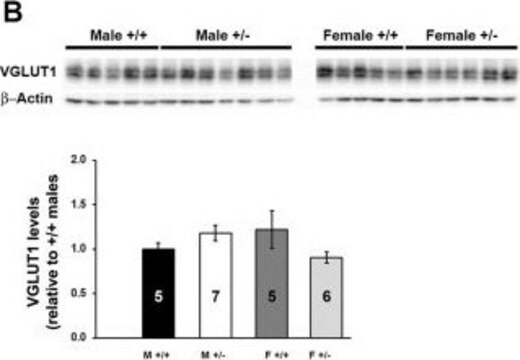MAB5366
Anti-Reelin Antibody, a.a. 164-189 mreelin, clone 142
clone 142, Chemicon®, from mouse
Synonym(s):
reelin
About This Item
Recommended Products
biological source
mouse
Quality Level
antibody form
purified antibody
antibody product type
primary antibodies
clone
142, monoclonal
species reactivity
mouse, vertebrates, human
species reactivity (predicted by homology)
rat
manufacturer/tradename
Chemicon®
technique(s)
immunohistochemistry: suitable
western blot: suitable
isotype
IgG1
NCBI accession no.
UniProt accession no.
shipped in
wet ice
target post-translational modification
unmodified
Gene Information
human ... RELN(5649)
General description
The reeler mutant in mouse displays an abnormal pattern of cell migration throughout the cerebral and cerebellar cortices. The preplate forms normally, and the neurons differentiate at the correct times in the ventricular zone. However, instead of forming the normal "inside-out" arrangement of neurons in the cortical plate, the older neurons are found furthest from the ventricular zone, while the younger neurons do not migrate far at all. The reeler cerebral cortex is inverted from that of the wild type mouse.
The defect of the reeler mice appears to be in the production of an extracellular matrix protein by the Cajal-Retzius cells (D′Arcangelo et al., 1995, Nature 374:719-723.; Ogawa et al., 1995 Neuron 14:899-912.) This 388kDa protein is made by wild-type mice but not by the reeler mutants. It is thought that this Reelin protein is crucial for positioning the migrating neuron within the cortical plate (Figure 1). In the absence of Reelin, the migrating neuron would be "lost," and the cortical plate would be abnormal. We do not yet know the mechanisms by which Reelin informs the cells as to their position, how the cell responds to Reelin, and why the absence of reelin should give an "inverted" plate. However, the identification of the protein encoded by the reeler gene should allow us to begin these studies.
Specificity
Immunogen
Application
Neuroscience
Growth Cones & Axon Guidance
1:250-1:500, In Western blots, reelin appears as three bands ~400 - 450, 300, and 180 - 200 kDa′s.
Immunohistochemistry:
1:250-1:500, 4% PFA fixed tissues. A previous lot of this antibody was used in IH.
Optimal working dilutions must be determined by the end user.
Quality
Western Blot Analysis:
1:1000 dilution of this lot detected Reelin on 10 μg of mouse brain lysates.
Target description
Physical form
Storage and Stability
Analysis Note
Mouse liver or kidney
Other Notes
Legal Information
Disclaimer
Not finding the right product?
Try our Product Selector Tool.
recommended
Storage Class Code
10 - Combustible liquids
WGK
WGK 2
Flash Point(F)
Not applicable
Flash Point(C)
Not applicable
Certificates of Analysis (COA)
Search for Certificates of Analysis (COA) by entering the products Lot/Batch Number. Lot and Batch Numbers can be found on a product’s label following the words ‘Lot’ or ‘Batch’.
Already Own This Product?
Find documentation for the products that you have recently purchased in the Document Library.
Our team of scientists has experience in all areas of research including Life Science, Material Science, Chemical Synthesis, Chromatography, Analytical and many others.
Contact Technical Service







